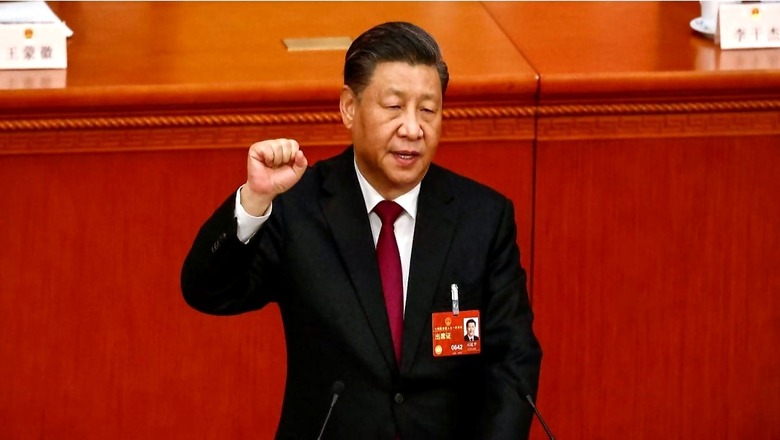China’s Spy Games: ‘Non-traditional’ Espionage Network Uses Students, Scribes, Industrialists Abroad

views
The 21st century started China’s journey towards becoming an economic superpower with a concentration of global manufacturing in the country. By 2010, it replaced the US from the leadership position. China had arrived, it was part of the global economy.
The world believed that 21st-century China, which was now a global manufacturing hub, will be more responsive and open to the international system. China’s soft power initiatives like Confucius Institutes and sporting extravaganzas like the 2008 Beijing Olympics were accepted, with a belief in the country’s potential.
But 22 years after its dream journey, China is back to the days of Chairman Mao under its current president Xi Jinping. And those very soft power initiatives are believed to have been turned into another layer of its global espionage operation as alleged by a number of many security agencies.
The hub – United Front Work Department (UFWD)
With close to a century of existence as the Chinese Communist Party’s (CCP) enforcer of ideology, the United Front Work Department (UFWD) is counted as a part of China’s intelligence network with its “soft espionage” potential. According to the US-China Economic and Security Review Commission (USESRC) of the US government, the UFWD works to co-opt and neutralise sources of potential opposition to policies and authority of the ruling CCP.
Its mandate is to manage and spread the CCP narrative about China, internally and externally, in one way or another. Having external outreach to almost all the countries in the world, coupled with its connection with the Chinese diaspora, the organisation is believed to have established itself as a hub of China’s non-traditional espionage.
A working organ of CCP central committee, the UFWD is believed to be luring, co-opting and recruiting ethnic Chinese people settled abroad for non-traditional intelligence operations. One of Mao Zedong’s magic weapons, the entity is an umbrella of organisations with separate wings devoted to influencing external states and politicians.
Under Jinping’s tenure, these “external influence operations” have gone on to the next level. Apart from being accused of stealing technology from other countries, the UFWD is also allegedly responsible for China’s covert operations abroad with many external security agencies defining it as the country’s second spy front or its non-traditional espionage network abroad.
Well-embedded in Chinese embassies, the UFWD operatives are considered middlemen for China’s hardcore spy operations. Its targets among people in other countries include Chinese diaspora, particularly Chinese students and scholars, associates and students of Confucius Institutes, journalists, academic figures, influential people, and industry leaders.
Its scale of operations can be understood by the fact that the UFWD is the main agency responsible for the CCP propaganda, ideological subversion and religious oppression in Xinjiang and Tibet. The same umbrella agency is also responsible for Chinese subversive and influence activities in Taiwan and Hong Kong.
In January 2022, Britain’s MI5 had warned about a Chinese agent, identified as Christine Lee, infiltrating the British parliament. Lee, founder of a law firm in the UK, was allegedly involved in UFWD covert operations. She tried establishing the CCP’s link with many current and aspiring British parliamentarians by way of donations. Funding for donation in most cases was from foreign nationals based in China and Hong Kong.
According to an analysis published by the Australian Strategic Policy Institute (ASPI), the CCP uses UFWD to infiltrate foreign state actors and political parties, industries, Chinese diaspora communities and higher educational institutions. The report also adds that the organisation in question has recruited around 40,000 new staff under Jinping to further its global operations.
In February 2022, a Canadian court held that a UFWD organisation in Canada – Overseas Chinese Affairs Office (OCAO) – was involved in espionage operations against the country. In September 2020, India ordered tougher scrutiny for visa requests from the Chinese Association for International Understanding (CAIFU), which is a part of the UFWD.
Confucius Institutes
The CCP government started Confucius Institutes in 2004 as an outreach programme to inform the outside world about China’s culture, tradition and history. One of the main aims of the programme was teaching Mandarin abroad. Its growth in numbers was astounding.
According to the Confucius Institute headquarters, from one in 2004, Confucius Institutes grew to 443 in 2014 with 648 classes in 115 countries. There were 149 Confucius Institutes in European countries; 144 in the US, Canada and Latin America; 95 in Asian countries; 38 in African countries and 17 in Oceania countries.
The world went with China’s words, allowing the country to share institutes and classrooms in universities and educational institutions abroad. The number of institutes further increased to 550 in 2019 with 1,172 classes in 162 countries, as per its official website.
But its glory did not last long as questions were raised on its functioning and its real aim, with China pushing in around $10 billion annually into the initiative, as per a report by the magazine Politico.
The official website defines Confucius Institutes as “non-profit education institutions jointly hosted by Chinese and foreign partners, with the aim of communicating Chinese, deepening international understanding of Chinese language and culture, and promoting people-to-people exchanges between China and the rest of the world”.
But critics find it is just another CCP propaganda organ. It is also alleged that being one of the UFWD playgrounds, these institutions are part of China’s non-traditional espionage network abroad.
A US Congress analysis says Confucius Institutes are controversial in nature with no academic freedom and transparency. Another Congressional Research Service report highlights how they are a breeding ground to recruit influence agents and tamper public opinion abroad. Reports also allege that they are engaged in cyber espionage and intellectual property theft.
US Congressman August Pfluger wrote in May 2023: ‘Confucius Institutes are used by the CCP to exploit the open, collaborative nature of American academia and conduct widespread industrial and military espionage inside the United States. Students and employees of these institutes infiltrate university campuses to steal intellectual property, intimidate Chinese dissidents, promote communist propaganda, and funnel information back to the People’s Liberation Army (PLA)’.
Senator Chuck Grassley warned all 74 colleges, universities and school districts with Confucius Institutes in 2020 about their role in China’s non-traditional espionage. The US once had 118 Confucius Institutes but by June 2021, the number reduced to 14.
The US State Department designated Confucius Institutes as foreign missions in August 2020 saying: “The opacity of this organisation and its state-directed nature are the driving reasons behind this designation.”
With growing hostility towards their work culture, not just in the US but in other countries as well, the sudden growth of Confucius Institutes has witnessed a slowdown in the last few years. Finland closed its Confucius Institutes over allegations of censorship and espionage.
Security was a major concern in Sweden as well behind the closer move. It was followed by Norway and then Denmark closed all its Confucius Institutes except one.
British prime minister Rishi Sunak calls China the largest threat to the world and wants to ban all 30 Confucius Institutes in the UK. He has accused China of infiltrating educational institutions and stealing technology.
India, in 2020, reviewed operations of Confucius Institutes after an alert from security agencies. The agencies were worried about growing Chinese influence in India’s higher educational institutes. In April 2022, Foreign Contribution (Regulation) Act or FCRA clearance was made mandatory for Confucius Institutes tie-ups.
The chain – Eyes and ears
In a globally connected world, China is the largest lender, manufacturer and exporter. The country has embassies worldwide. Its Confucius Institutes are dotted across continents and countries. Its diaspora is the third largest in the world, as per a UNESCO report.
This means the UFWD has potential non-traditional spies across the world. The core focus is to target grapevines, be it bureaucratic, educational, or industrial. Operators in China’s non-traditional espionage network are believed to develop ecosystems to start channels of communication with their targets.
Once they get some significant and sensitive grapevine, they pass it on to the next level of intelligence machinery. They act as the eyes and ears of China’s hardcore spying operations, adding significant value to an existing system.
Chinese students abroad main target
Chinese students abroad have been implicated in espionage operations. In 2005, a Chinese student network was identified as a front for economic espionage in Belgium.
Another USESRC analysis on the UFWD states that spies posted in Chinese embassies are directly in touch with Chinese students working as UFWD operatives. Most of the 200 Uighur students detained in Egypt’s Cairo in 2017 were deported to China. It happened again with the help of a Chinese student who headed the Chinese students’ association in the city.
It is also alleged that most of these Chinese student bodies are directly funded by their government or embassies. The Foreign Policy in 2018 reported that the Chinese student association of Georgetown University received almost half its funding from the CCP government in China.
A point may be raised that this funding might be generic in nature but its use in non-traditional spy operations cannot be ruled out. In September 2020, the US revoked 1,000 Chinese student visas after it was found that they had ties with the Chinese military and some were even involved in espionage operations.
These non-traditional Chinese spies also target people in the media network abroad. In one of their several working methods, it surfaced that they pose as professionals associated with high-profile consulting or policy groups based in the US or some other western country. They invite applications as the first step to know the knowledge level of the possible recruit.
Their first invitation is about a full-time position. The second invitation mail is about converting that full-time position to a part-time job. The logic is that the agency will see their work initially for some time before making them a full-time consultant.
The tapped potential recruits are bright mediapersons with connections. Part-time work means third-party payment. Here, they use co-opted Chinese diaspora to fund money to these part-time recruits in exchange for a grapevine of importance. Their focus is mainly political, defence and economic sectors.
The security fineprint needs to be further firmed up to check and prevent information leaks through these non-traditional spy channels. The situation becomes more difficult when a person supposed to be part of China’s non-traditional espionage operations is sitting abroad and connected to the target digitally.
Read all the Latest India News here




















Comments
0 comment